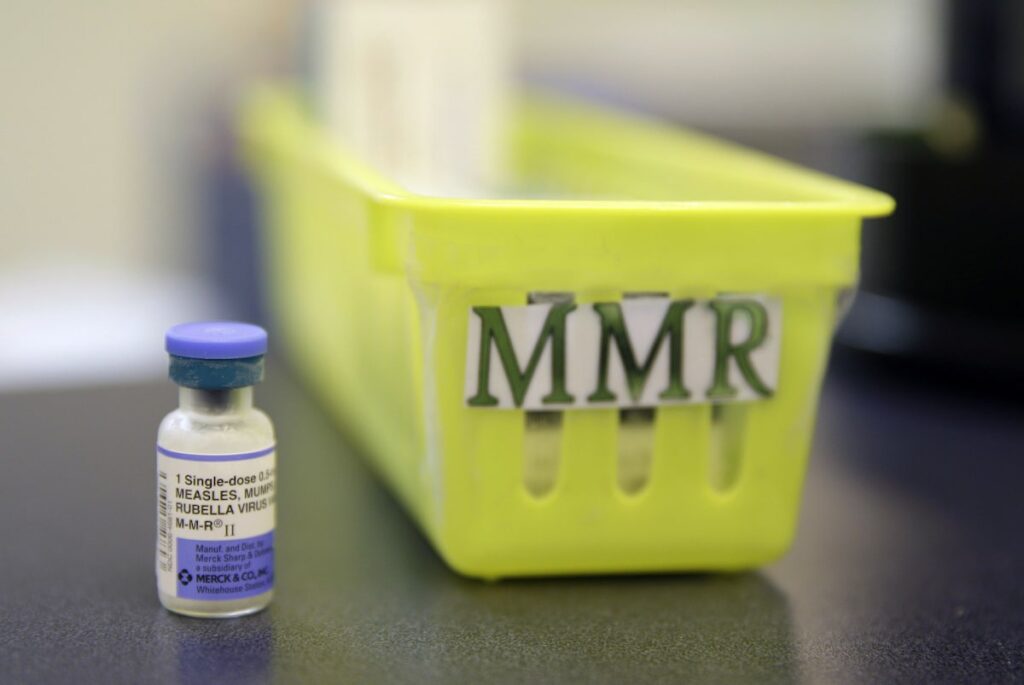While most of Canada’s current measles cases are linked to international travel, this is not the case in parts of Quebec and Ontario, meaning the virus is being transmitted in the community.Eric Risberg/Associated Press
Public health officials are recommending Canadians check their vaccination status before traveling abroad after measles cases have been discovered in multiple provinces.
Ten measles cases have been confirmed in the Montreal metropolitan area in the past few weeks, five in Ontario, and at least one in both British Columbia and Saskatchewan.
Most cases are linked to international travel, but parts of Quebec and Ontario have not, meaning the virus is being transmitted in the community.
The measles virus is airborne and highly contagious, and initially causes symptoms similar to a cold or flu, such as fever, cough, runny nose, and bloodshot and watery eyes. About 2 to 3 days after symptoms appear, small white spots may appear on the inside of the mouth and throat. After about 3 to 7 days, a rash appears on the face and spreads to the body, arms, and legs. The incubation period is approximately 10 days, and infected people are contagious from 4 days before to 4 days after the rash appears.
The virus can cause serious complications such as pneumonia and respiratory failure. According to the Public Health Agency of Canada. Approximately 1 in 1,000 people infected with measles develops encephalitis, which can cause hearing loss, blindness, and developmental disabilities in children.
One to three out of every 1,000 people with measles die from the disease.
Theresa Tam, Canada’s chief public health officer, urged Canadians to get two doses of the measles vaccine, especially before traveling. In 1998, Canada was declared measles-free. This means that the source of measles is no longer in this country. However, more than a dozen cases have been reported this year. In 2023, only 12 cases were reported for the entire year.
To prevent the spread of measles in a community, 95% of the population needs to be vaccinated. But the Public Health Agency of Canada said measles vaccination rates in the country remain below that level, in part because routine childhood immunizations have been disrupted by the COVID-19 pandemic.
Here’s what you need to know about checking your vaccination history and where you can get vaccinated if needed.
How many doses of the vaccine should people receive?
Both the measles, mumps, rubella (MMR) and measles, mumps, rubella, varicella (MMRV) vaccines are available. Efficacy is estimated to be 85-95% when given as a single dose at 12 or 15 months of age. The second dose is almost 100 percent effective.
Unlike COVID-19 or influenza, the measles virus is stable and does not mutate. This means that people who received two vaccinations as children still have immunity, and people who have recovered from measles have permanent immunity.
infant
Infants cannot be vaccinated until their first birthday because they are one of the groups at highest risk for measles. However, infants aged 6 to 11 months can receive the MMR vaccine if they travel to areas where measles is endemic. Public health experts say caregivers should consult a medical professional to determine eligibility.
The kids
Two vaccinations are recommended for routine childhood vaccinations. The first dose of the MMR vaccine or her MMRV vaccine should be given at 12 to 15 months of age, and the second dose should be given at 18 months of age or before school (approximately 4 to 6 years of age).
If children or adolescents under the age of 18 have not received routine immunizations, they must receive two vaccinations at least 4 weeks apart.
Adults born after 1970
Adults born after 1970 need one dose of the vaccine. However, if traveling internationally, the Public Health Agency of Canada recommends that this age group receive a total of two doses. pregnant person You should not receive the MMR or MMRV vaccines because of the theoretical risks to your fetus.
Adults born before 1970
These adults are presumed to have acquired natural immunity to measles because they likely were infected with measles during an endemic outbreak in Canada. If you know that you do not have measles, or If you have not been vaccinated and are traveling abroad, you can receive one dose of the vaccine. In December, the World Health Organization warned of an “alarming” increase in measles cases in Europe.
Adults at higher risk of exposure
Two doses of the MMR vaccine are recommended for all adults at high risk of exposure to measles, such as healthcare workers and military personnel.
For more information, the Government of Canada provides the following information: Complete breakdown of immunity criteria.
How to check your or your child’s immunization record:
To obtain vaccination records, contact your doctor or previous health care provider.You can also contact Contact local public health authorities.
Where can I get the vaccine?
The MMR or MMRV vaccine is available at your primary care physician, your state’s public health department or health department, and some pharmacies in some states. Pharmacies in British Columbia, New Brunswick and Newfoundland are now offering measles vaccines for adults and children aged four and older.
No vaccine records found. What now?
Canada’s public health agency urges people to talk to their health care provider about booster vaccinations if they don’t remember or have questions about whether they’ve received their second dose.
Sherry Bolotin, director of the Center for Vaccine Preventable Diseases at the University of Toronto’s Dalla Lana School of Public Health, said there’s no harm in getting a second dose of the MMR vaccine, even if it turns out you’ve had two doses. “There’s no relationship between adverse events and increasing doses. It’s a very, very, very safe vaccine.”
Read more:
Andre Piccard: Measles recurrence is a cause for concern, but not something to be taken lightly
Dr. Dawn Bowdish: Measles is not a harmless childhood infection
By Carly Weeks, Frédérik-Xavier Duhamel, The Canadian Press

